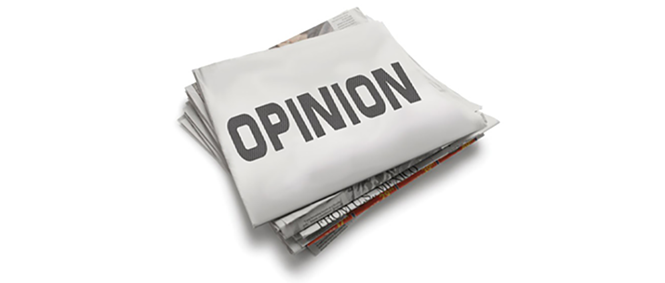American newspapers and mass media may be referred to as the "free press," but they are anything but free. While rabid Trump supporters have continuously howled accusations of "fake news," they might actually have a point. After all, a) The news is not always necessarily correct; and b) News is predictably sorted by how much advertising it can sell or by the views of the media's ownership. Unpopular but newsworthy stories often get buried. I am particularly disturbed, as a journalist, that the news is largely the de facto servant of advertising dollars and management's opinions, instead of the balanced coverage it ought to be.
Case in point: Rainer Huck, Ph.D., retired engineer and a two-time unsuccessful candidate for Salt Lake City mayor, recently filed a lawsuit in federal court, claiming that the wholesale closure of public lands to motorized vehicles is highly discriminatory to certain groups of the population—namely, the elderly and disabled. He prepared a news release on July 29 that was sent to scores of Utah newspapers, which read, in part, "The American Public Lands Equal Access Lawsuit was filed in Federal District Court against the Bureau of Land Management (BLM) because the agency has systematically eliminated access—by virtue of excluding motorized travel—for elderly, disabled, and handicapped persons ..." The lawsuit seeks redress for generations of biased and discriminatory management practices. Huck noted that, during the past 40 years, the percentage of public lands previously open to motor vehicles has dropped from 95% to only 5%.
The lawsuit states: "Plaintiffs assert that all Americans, regardless of religion, age, race, health, strength, economic standing, and especially those who are handicapped or disabled, have constitutional and other legal rights to access public lands held under the jurisdiction of the BLM on a basis equal to those who have the strength and ability to travel by muscle power."
To me, Huck's news release was interesting and compelling, pointing out what can only be seen as built-in BLM discrimination against the elderly and disabled. Utah has fabulous natural beauty, but it belongs only to the young and strong; others are out of luck. Although the aged and infirm are generally considered to be inherently newsworthy, not one of Utah's news organizations chose to run the story.
But, oops, another lawsuit, closely related to Huck's news release, came along only a few days later. It got highly-visible coverage, plastered over dozens of newspapers and made its way into the evening news. The Salt Lake Tribune was among the organizations that covered the new suit filed by the environmental group Southern Utah Wilderness Alliance (SUWA). It's one of those groups that has faithfully barraged media with reasons why public lands should not be public, and particularly why motorized vehicles should be barred.
SUWA's lawsuit, which is enjoined by other environmental watchdogs, accuses the BLM of improperly ending the 13-year closure of 5,400 acres surrounding Factory Butte (near Hanksville) to off-road vehicles. It asserts that the BLM violated the law by not giving proper notice and opportunity to debate the re-opening, though the BLM claims the issues were thoroughly studied before the closure was rescinded.
The reality is that the problems of access need to be intelligently balanced with environmental concerns. In this case, SUWA argues that the Wright Fishhook Cactus deserves protection, and no off-road vehicles should be allowed. I hold the belief that, for the media to serve its public responsibility, both stories deserved coverage—rather than quashing one through an arbitrary pick-and-choose routine.
Reflecting on what appears to be visible prejudice of Utah's news organizations, it's easy to see why the public is suspicious of the media. For some reason, the ravings of rabid environmentalists are one of the trump cards for what gets printed and aired. My take is that a significant amount of environmentalist noise is merely specious grandstanding, and the areas being protected are often not nearly as vulnerable as the tree-huggers would have us believe.
The red rock country around Moab and Canyonlands is an excellent example of how motor vehicles don't have to hurt the environment, and how the majority of motorized sightseers hold a responsible attitude toward the privilege of access. As for the aged and disabled, there is no alternative; either they will be able to enjoy these lands with the help of motorization, or they won't at all.
The media should strive to regain trust as the "watchdog of our society," and that means covering the news with an impartial and fair approach—not just those stories that please owners and stroke their partisan base.
The author is a former Vietnam-era Army assistant public information officer. He resides in Riverton with his wife, Carol, and one mongrel dog. Send comments to comments@cityweekly.net
More by Michael S. Robinson Sr.
-
What would Jesus say? An exclusive interview with the divine
Taking a Gander
- Apr 17, 2024
-
Trump’s fire-resistant Pajamas: A one-act play for adults
Taking a Gander
- Apr 10, 2024
-
Young Americans need to see through Donald Trump’s ulterior motives
Taking a Gander
- Apr 3, 2024
- More »
Latest in Opinion
Readers also liked…
-
Russian Army Conscripts Asking, 'Where's Our Underwear?'
Smart Bomb: The completely unnecessary news analysis.
- Dec 21, 2022





